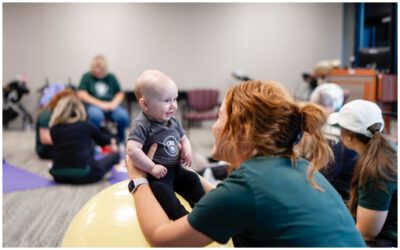[title subtitle=”Words and images courtesy Alicia Agent, Director Marketing Communications, Baptist Health – Fort Smith”][/title]
For Cindy Smith, a registered radiologic technologist and sonographer at Baptist Health Breast Center-Fort Smith, discovering her risk of cancer was important. Thanks to genetic testing it was easy.
Cindy’s mother died of breast cancer at the age of forty-five in the late 1990’s and as a healthcare professional she knew this increased the risk of cancer not only for herself but her two sisters. But it wasn’t until a visit with a gynecologist nearly ten years later that the topic of genetic testing for hereditary cancer came up.
“We decided I would get the test and if I was positive, then my sisters would also be screened,” Smith said.
Smith tested positive for BRCA2, a gene that puts her at a higher risk of breast, ovarian and pancreatic cancer, as well as melanoma. Her sisters tested positive, too, leaving the women to decide what preventative measures, if any, would be taken.
Anne Bowes, D.O., an obstetrician and gynecologist with Baptist Health Women’s Clinic-Fort Smith, says it’s important for women to discuss their family history and genetic risk factors with their physicians.
“Hereditary breast cancer, which is associated with BRCA 1 or 2, is linked fairly closely with ovarian cancer. In Lynch Syndrome, a genetic condition which makes someone more likely to develop cancer, we can see increased risk for colon cancer, endometrial cancer, and other cancers associated with the gastrointestinal or genitourinarytract. In these cases, it’s important to take a detailed family history,” Dr. Bowes said.
“When my mom was diagnosed, there wasn’t a lot of education or discussion about cancer or genetic testing,” Cindy said. “Public knowledge of women’s health, genetics and testing options have improved so much over the last twenty years. It’s incredible.”
Cindy and Dr. Bowes agree it’s important for women to keep the conversation going. Health care providers and advocates across the country turn their attention to ovarian and breast cancers each fall with activities surrounding national health observation months.
Baptist Health works with physicians and local organizations to raise awareness about symptoms for both diseases and ways women can understand their own risks.
Ovarian cancer is the second most common gynecological malignancy and the most common cause of gynecological cancer death in the United States – usually due to its late detection, according to Dr. Bowes.
“Most early stage ovarian cancers, unfortunately, will escape even the best physical exam because the ovaries anatomically lie deep within the pelvis,” Dr. Bowes said. “They are often difficult to palpate. By the time the ovary grows large enough to be plainly felt or cause a problem for the patient, if cancer is involved, it is often at a more advanced stage and may carry a worse prognosis.”
Some of the symptoms of possible ovarian cancer include:
- Bloating
- Pelvic pain
- Difficulty eating or feeling full quickly
- Urinary symptoms, such as the frequent or sudden urge
“As women I don’t think we don’t think enough of ourselves to go and talk to someone about our bodies and our health, but we should,” Dr. Bowes said. “If a woman begins to develop any persistent symptoms that are different from their ‘normal’ feelings, then she should talk to her gynecologist.” While there’s not a good process in place for screening for ovarian cancer, Dr. Bowes says genetic counseling can play a huge role in helping a woman make informed decisions about her health.
Cindy and her coworkers at Baptist Health Breast Center-Fort Smith work closely with Myriad Genetic Laboratories to offer Myriad myRisk®Hereditary Cancer tests and education at the center. Myriad myRisk®Hereditary Cancer tests help detect mutations in multiple genes associated with an increased risk for eight different cancers. It all starts with a video and a phone call with a genetic counselor. Blood is drawn in the center and sent off for testing if the patient decides they wish to learn more about their genetic risk of cancer.
If a gene mutation is found, individuals with hereditary cancer risk or familiar cancer risk – a combination of genetic and environmental factors – can work with genetic counselors and physicians to personalize a prevention plan that may include increased surveillance, risk-reducing medications or surgery and treatment options.
Cindy says she understands why some might be nervous or reluctant about going through with genetic testing because of fear of the results. But she says it’s important to prepare yourself emotionally.
“It could be a bother, or it could be blessing. It’s up to you to decide how you react to the information and how you use it,” she said. “For me, I saw the information as a tool, something I could use. I make sure to get regular check-ups and mammograms, whatever is recommended for a woman like myself with certain risk factors such as a family history of cancer.”
For more information on genetic testing, breast cancer assessment, 3D digital mammography or other services provided at Baptist Health Breast Center-Fort Smith, call (479) 709-1913.




